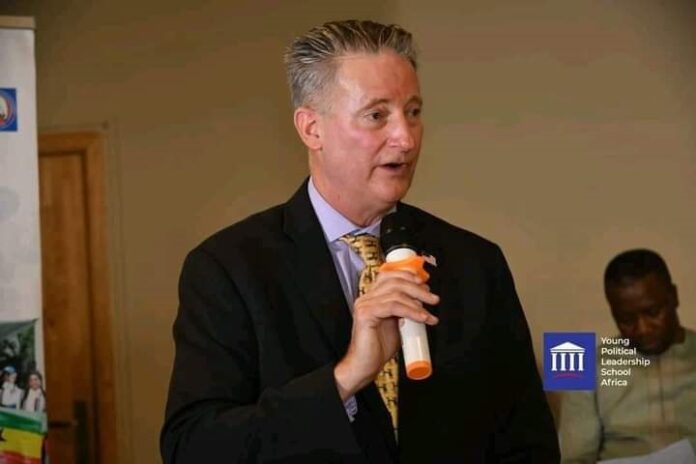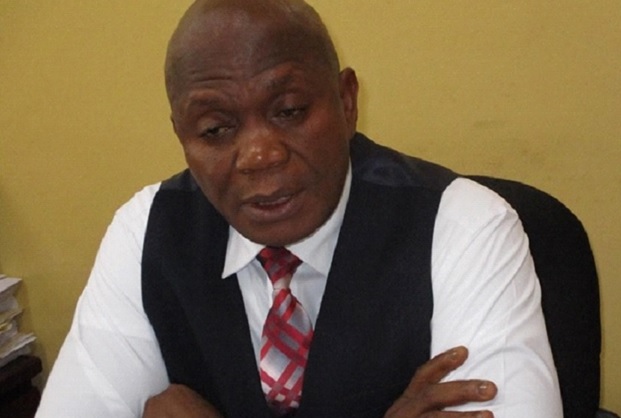MONROVIA – The Ambassador of the United States accredited to Liberia has recommended a brand new system that he thinks will accelerate plans for fiscal decentralization in Liberia.
Making remarks at a program held at the Ministry of Finance and Development Planning recently, Ambassador McCarthy emphasized that the Weah Government must accelerate the decentralization program now.
“The government can — and should — do more, not in 2026, not in 2023, but NOW! It should accelerate plans for fiscal decentralization, including making the necessary amendments to the Public Financial Management Act, to allow counties to raise and spend – subject to appropriate safeguards – their own revenues. Putting resources directly in the hands of local governments will help make services readily available to citizens at the community level”, Ambassador McCarthy noted.
He continued: “I am honored by your invitation to speak to you today about the importance of public sector reforms, particularly reforms designed to create a strong public financial management system for Liberia.
“A strong public financial management system, as you know, promotes efficient and accountable governance. And governments that are efficient and accountable do a better job at delivering public goods and services, providing for the poor, and creating an environment that attracts investments, spurs private sector growth, and creates jobs”, he told the program.
According to the United States Ambassador, if there is any country that desperately needs broad-based economic growth, job creation, and poverty reduction that comes from a robust public financial management system, it certainly is Liberia.
He spoke about the twin shocks of the Ebola epidemic and the sharp decline in commodity prices which he pointed out, stalled Liberia’s post-war economic recovery just as it hit its stride; adding that there has been no lull.
The US Ambassador said COVID-19 and now the spillover effects, including inflationary pressures, of Russia’s invasion of Ukraine have again hampered Liberia’s economic recovery.
“The resulting accumulated effects of Liberia’s stalled economic growth are glaring. Liberia’s GDP per capita stands at just over $600, less than half of what it was in real terms in 1980; the revenue-to-GDP ratio is below the average for Sub-Saharan Africa, rendering the country unable to provide basic public services. The World Bank Human Capital Index tells us that a child born today in Liberia will only be 32 percent as productive when she grows up as she could have been if she had full access to education and healthcare services,” adding “This is the depth and scope of the social and economic problems Liberia faces.”
The US Ambassador noted that to state the problems is not to fix the blame on any government, any political party, or any one leader; indicating that it is only by realizing the scale and magnitude of the problems that we can begin to appreciate the urgency of putting in place a public financial management system Liberia desperately needs and deserves – one capable of mobilizing Liberia’s vast potential resources and allocating them to their most productive and equitable uses, so that they lift the lives of all Liberians.
Liberia, with the support of its donor partners, has put in place some far-reaching public financial management and governance reforms that include the Public and Financial Management Act of 2009 and related regulations to ensure the sound management of public finances and the enactment of the General Auditing Commission Act of 2014 designed to enhance the independence of the Commission.
Ambassador McCarthy said Liberia also deserves credit for the establishment of other accountability institutions, like the Liberia Anti-Corruption Commission, and the Purchasing Procurement and Concessions Commission, designed to improve and bring transparency to public procurement processes; and more recently, and with the strong support of the United States Government and other donors, Liberia enacted the Local Government Act, providing the legal and regulatory framework for decentralization and local governance reforms.
He thanked President Weah for quickly signing into law this very important legislation as well as the Land Rights Law that he noted if properly implemented would bring enormous benefits to rural communities, helping them unlock the value of their land and generating wealth with broad positive ramifications for the Liberian economy.
Despite these new institutions and laws, Ambassador McCarthy disclosed that Liberia still faces many public financial management challenges.
He indicated that there is still much work to be done on consolidating government cash balances into a Treasury Single Account.
State-owned enterprises are still not subject to appropriate oversight and accountability for how they use and manage the revenues they generate he noted, while emphasizing that efforts must be placed on enforcing tax compliance, identifying non-filers, and monitoring inaccurate reporting, particularly by those with the means to pay their taxes.
The US Ambassador said Liberia has adopted key reforms and established important accountability institutions but stressed it would do little good to talk about reforms in the abstract.
“What Liberia now needs above all is the political will and administrative discipline to implement the well-meaning reforms it has adopted and allow its various key accountability institutions to fully do the jobs they were established to do.”
He stated that the Legislature must move forward with legislation for revenue sharing between the central government and sub-national governments which are also critical for ensuring equitable revenue distribution across the country, ensuring that all Liberians benefit from the nation’s wealth.
As part of its decentralization reform efforts, the Ambassador urged the government to put in place mechanisms to improve citizens’ participation in the national budget formulation processes.
Quoting the International Budget Partnership, Ambassador McCarthy said Liberia currently has a score of 6 (out of 100) for public participation in budget formulation and execution.
“Improving participatory budgeting would help the Government of Liberia to better reflect and respond to the needs of its citizens through the national budget.
“The government also needs to ensure funds are used for their designated purposes. I understand that road rehabilitation and maintenance is a high priority for the Liberian government under the PAPD. However, despite this prioritization, millions of dollars of essential funding from the Road Maintenance Fund have unfortunately been used for other purposes – in violation of the Road Maintenance Act and fundamental public financial management principles.”
The road funds comment by the Ambassador is seen as a direct rebuff of the Finance Minister, who had suggested he obtained approval from international partners including the United States to spend over twenty Four Million United States Dollars without legislative approval.
The ambassador wants the government to ensure it does not erode the gains made in the fight to promote accountable governance in the country.







